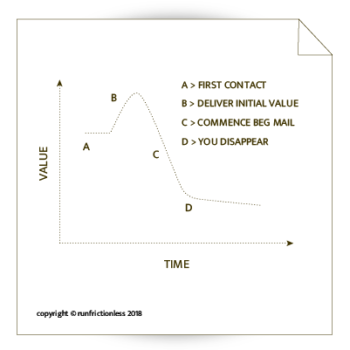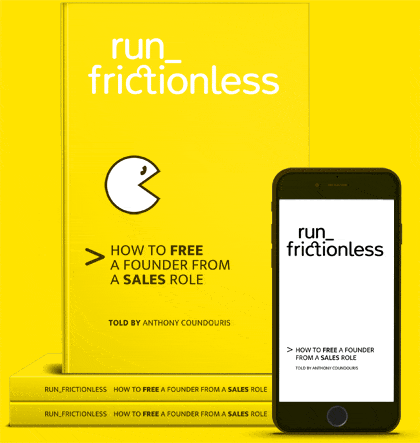
Seven signs you need a sales system
>
Seven signs you need a sales system
Your salesperson gave customers inaccurate product information last quarter? Or you discover typos in emails and proposals written by your salespeople? Congratulations! If you answered yes to either of the above, you qualify for a sales system.
Here are the seven tell-tale signs that your startup needs a sales system. Founders – ignore these seven signs at your peril!
You write email from scratch
You catch yourself writing email from scratch. Each time a customer arrives at your shop front they are treated differently. Each salesperson writes email with different content. A great deal of time is lost writing bespoke email that is inaccurate, untested and lacking zest.
You send beg mail to customers
It is common practice for salespeople to pester the customer with beg mail. They resort to high-pressure sales techniques to close the deal or beg for a decision. Beg mail ruins any credibility built in the early game. The more beg mail you fire at the customer, the more credibility is lost.
A salesforce that sends value mail has the advantage. This organization stays top of mind, standing out from the pack as being valuable, honest and confident. Competitors bombard the customer with beg mail fade out and become background noise. Two examples of value mail you could send a customer after a demonstration of the product:

You get no customer reviews
Quite often salespeople serve the wrong customer profile. The salesperson knows a customer will have a bad experience if they purchase the product today. Perhaps a critical feature is missing essential for this profile. If you know in your heart a customer will not write a positive review after you perform a service, this profile may be better served tomorrow or not at all.
You hire and fire your replacement
Here’s how this “hire my replacement” story plays out.
You hire Jack. Jack sits next to you, follows you on the road, meets you after work, and has coffee with you and your family in the morning having spent the night on your living room floor. Jack is doing all the right stuff.
But Jack never sells more than you do. Why? Because Jack is not a chef, he is a cook. Jack can bake a cake, not write the recipe to bake the cake. If Jack could write a recipe, he’d be a founder of a startup too.
Your business never grows
You reach a ceiling – the maximum number of customer interactions you can support daily. If you try to grow the business, the customer experience fails and you bleed customers. The reason is simple enough. You cannot be in all places, at the same time. If your intention is to grow the company you have to pass this problem.
A sales system will remove you from the center of every customer interaction.

You ignore your executive role
People don’t get paid on time. There are no peer reviews. Staff birthdays are missed and not celebrated. This behavior drives a wedge between the founder and the organization, because only sales count. The organization looks healthy because sales targets are met, but inside the company is crumbling.
You get busted future-selling (regularly)
Future-selling is when you commit the startup to build a feature tomorrow, in order to make a sale today. The startup makes the sale contingent on a feature which may not have been specified, costed or the feature thoroughly tested with the code-base.
Because the feature is unspecified, the precise date of the release is hard to predict, making the sale a moving target.
Key takeaways
Learn more




